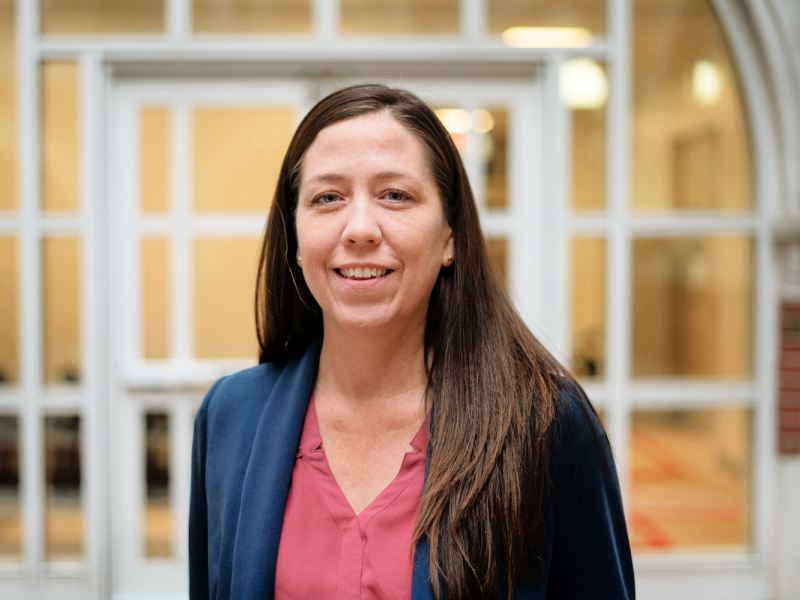Home / First Amendment Clinic Director receives award for public interest leadership
First Amendment Clinic Director receives award for public interest leadership
July 28, 2023 3:30 PM
|

Tulane First Amendment Clinic Director Katie Schwartzmann is the recipient of the New Orleans Bar Foundation’s Mark Moreau Award for Public Interest Law.
The Award, among the highest honors of the NOBA, recognizes public interest lawyers with “keen legal minds who exhibit service, leadership, and mentorship in the highest ideals of the profession,” the Foundation noted in announcing the award, which bestows a $1,000 gift on the nonprofit where the recipient works.
Schwartzmann (L’03) is the inaugural Director of the Tulane First Amendment Law Clinic, which launched in 2020. She is a long-time civil rights attorney who now applies her extensive experience in and out of the courtroom to grow and support Tulane Law students in becoming excellent lawyers.
.jpg)
student-attorneys.
Under her leadership the clinic has represented locals in a myriad of First Amendment cases. Among them: city workers suing the City of New Orleans for its social media policy meant to silence negative views; librarians fighting against book bans; a man who was told not to fly expletive-laden political flags off his truck; musicians threatened with arrest for playing music in the French Quarter; residents seeking to protest against industrial pollution; and journalists who face obstacles to covering stories.
“We are delighted to have Professor Schwartzmann’s incredible work for the community recognized by the New Orleans Bar Association," said interim law Dean Sally Richardson. "Under Katie’s leadership, the First Amendment Clinic has represented a wide range of clients all seeking to defend their First Amendment rights. Katie’s direction of the Clinic has allowed Tulane Law students to serve the public in ensuring free speech remains a protected right.”
Before returning to Tulane Law, Schwartzmann was the legal director of the American Civil Liberties Union of Louisiana, overseeing a robust docket of cases challenging impingements on freedoms of speech, the press, religion, due process, unlawful search and seizure, police misconduct and cruel and unusual prison conditions. Under her leadership, the ACLU represented widely diverse voices across the political spectrum, including journalists, police officers, prisoners, protesters and activists.
Schwartzmann has also previously served as managing director of the Southern Poverty Law Center and was founding co-director of the Roderick and Solange MacArthur Justice Center in New Orleans. In both capacities, she leveraged class action cases to drive sweeping reforms in Louisiana regarding criminal and racial justice. Among her successes, she led the legal team that won a groundbreaking case in 2012 to advance fair treatment of detainees in the Orleans Parish Prison, and also successfully challenged the extreme use of solitary confinement on men with mental illness housed in the Louisiana Department of Corrections.
“The Selection Committee for this year’s Mark Moreau Award quickly recognized that Katie was the rightful recipient," said Colleen Jarrott, President of the New Orleans Bar Foundation. "Katie not only personifies the attributes that we look for in a recipient, but she also met every aspect of the nine-factor criteria used to determine who should be an awardee. Katie’s commitment to public interest law is unwavering and that is exemplified by the diversity of clients that she has represented successfully over the last 20 years.”
The NOBA’s Moreau Award looks to honor lawyers in the community who have “dedicated themselves to serving the poor through public interest law in a local nonprofit legal services organization,” according to NOBA. It is named to honor Mark Moreau, a former executive director of Southeast Louisiana Legal Services (SLLS) who spent his life serving those who could not afford representation.
Among Moreau’s most impressive achievements was serving as counsel on a case that established the right of the poor to receive medical care in hospitals. He wrote case manuals on how to do pro bono work and trained scores of public interest lawyers, whose impact will continue to be felt in the community for generations. His work inspired scores of law students, legal aid lawyers, and volunteer lawyers to dedicate their careers or their time.